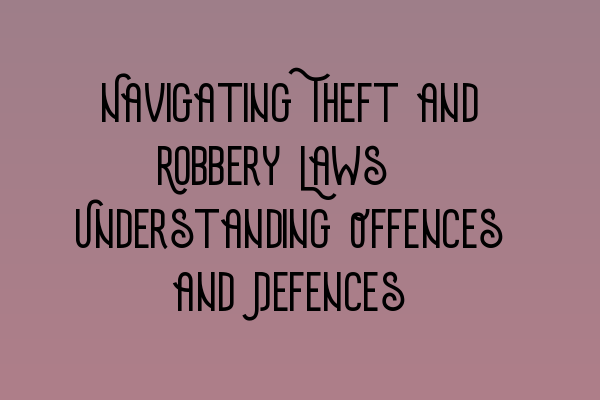Navigating Theft and Robbery Laws: Understanding Offences and Defences
When it comes to theft and robbery laws, it is crucial to have a solid understanding of the various offences and defences associated with these crimes. Theft and robbery are serious criminal offences in the UK, and being charged with either of these crimes can have significant legal, financial, and personal consequences. In this article, we will explore the key aspects of theft and robbery laws, including the definitions, penalties, and potential defences.
Theft Offences
Theft is defined as the dishonest appropriation of someone else’s property with the intention to permanently deprive them of it. There are several types of theft offences, including:
- Simple Theft: This is the most basic form of theft, involving the unlawful taking of another person’s property without their consent and with the intent to permanently deprive them of it.
- Shoplifting: Shoplifting is a form of theft that involves stealing goods from a shop or retail establishment.
- Burglary: Burglary is the act of entering a building or premises with the intent to commit theft.
- Handling Stolen Goods: Handling stolen goods is a separate offence that involves knowingly buying or possessing stolen items.
The penalties for theft offences vary depending on the specific circumstances of the case. In general, theft is considered a crime that can be punished with imprisonment, fines, or both.
Robbery Offences
Robbery is a more serious offence than theft and involves the use or threat of force to steal from another person. The key elements of a robbery offence include:
- Force or Threat of Force: Robbery involves using force or the threat of force against the victim. This can include physical violence, the use of weapons, or intimidation.
- The Taking of Property: In a robbery, the offender takes property from the victim’s immediate possession.
- Intent to Permanently Deprive: Like theft, the intention to permanently deprive the victim of their property is a crucial element of robbery.
The penalties for robbery offences are severe, as they involve violence and endangerment of individuals. Robbery is considered a serious criminal offence and can result in significant prison sentences.
Defences to Theft and Robbery Charges
When facing charges of theft or robbery, it is essential to explore the available defences to strengthen your case. Some common defences in theft and robbery cases include:
- Lack of Intent: If it can be proven that you did not have the intention to permanently deprive the owner of their property, it may be possible to argue against the theft or robbery charges.
- Mistaken Identity: In cases where there is a reasonable doubt about your identity as the offender, a mistaken identity defence can be raised.
- Consent: If you reasonably believed that you had the owner’s consent to take the property, this can be used as a defence in theft cases.
- Self-Defence: In some cases of robbery, where the use of force was in self-defence against an imminent threat of harm, it may be possible to argue self-defence as a defence.
It is crucial to consult with an experienced criminal defence solicitor if you are facing theft or robbery charges. They can assess your case, identify potential defences, and help build a strong defence strategy tailored to your specific situation.
Conclusion
Understanding the complexities of theft and robbery laws is vital for anyone navigating the criminal justice system. By familiarising yourself with the various offences and defences associated with theft and robbery, you can better protect your rights and build a robust defence in case you are charged with these serious crimes. Remember to consult with a qualified criminal defence solicitor for expert legal advice and guidance throughout the legal process.
Read more on related topics: Demystifying the Solicitors Qualifying Examination Format, LLC Formation Made Simple: Step-by-Step Guide for UK Entrepreneurs, LLC Formation: A Step-by-Step Guide for UK Entrepreneurs, Business Regulations in the UK: A Comprehensive Overview, Ethical Considerations in UK Law: Upholding Professional Standards.
